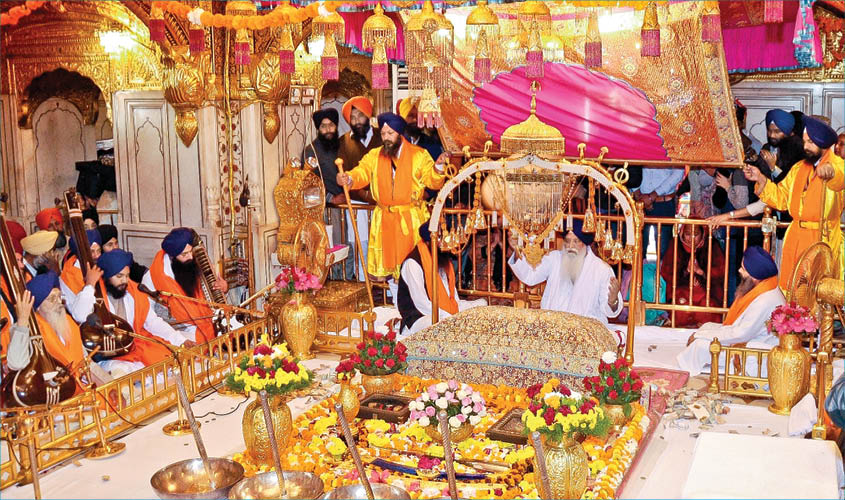He was a saint, scholar, poet, author, guide, revolutionary, who believed in gender equality.
I am not a Sikh. My wife is the elder sister of Punjab Chief Minister Amarinder Singh.
When I was ambassador to Pakistan in the early 1980s, my wife and I visited Panja Sahib and Nankana Sahib.
On Friday 23 November, Sikhs all over the world celebrated the 550th anniversary of the birth of Guru Nanak Devji (1469-1539). He was the founder of Sikh religion. I consider him among the ten greatest Indians of all time. He was a saint, scholar, poet, author, guide, revolutionary, who believed in gender equality. Some of his pronouncements have become a part of Hindi vocabulary: “Kirat Karo, namjapu, wand chhako”—hard and honest labour, meditation and share what you have. He emphasised interfaith harmony, protection of the environment. Another of his saying is “naa koi Hindu naa Musalman.” He decried caste barriers. The langar—community feeding in gurudwaras was available to everyone. He had no regard for ritualism. He interests me because of his glorious spiritualism. His life and teachings inspire me. I cannot read Gurmakhi, but I have read him in excellent English translations, the best perhaps by Khushwant Singh.
Who were Guru Nanak’s international contemporaries? Leonardo da Vinci (1452-1519), Michelangelo (1475-1564), Raphael (1483-1520), Sant Kabir (1440-1518), Nicolaus Copernicus, (1473-1543), Martin Luther (1483-1546), Vasco da Gama (1469-1524), Erasmus (1469-1536), Niccolo Machiavelli (1469-1527), Christopher Columbus (1451-1506), to name the most prominent ones.
Guru Nanak’s travels took him to many parts of India and West Asia. When I visited Baghdad, a priest in the main mosque referred to the Guru’s visit to Baghdad.
During his lifetime he witnessed the rule of five Muslim rulers—Bahlol Lodi (1451-1489), Sikandar Lodi (1489-1517), Ibrahim Lodi (1517-1526), Babar (1526-1530) and Humayun (1530-1540).
Babar was a fanatic Muslim, who showed no mercy to Hindus. Hari Ram Gupta in Volume 1 of his, History of the Sikhs writes about Babar’s atrocities in the town of Sayyadpur, not far away from Lahore: “The town was mostly inhabited by Hindu traders and Zamindars. They offered considerable resistance in order to save their lives, honour and property. This infuriated Babar. He ordered a general massacre of the people. All the young women were reduced to slavery. The older ones were forced to grind and cook food for the troops. The town was looted and then destroyed by fire. Nanak and Lalo (one of the Guru’s followers) were forced to carry heavy loads of looted property on their heads to the camps and grind corn…the barbarous treatment of prisoners in the camp, parthenolatry of women, broke the tender heart of Nanak. The shock and pain were too acute for him to bear. In his four hymns collectively called Babar Vani, describes Babar’s outrageous (actions) against women:
“Their tresses that adorned these lovely heads. And were parted with vermilion. Have been shorn with cruel shears; dust has been thrown on their shaven heads, they lived in ease in palaces; Now they must beg by the roadside, Having no place for their shelter.”
Guru Nanak wished to build a community of self-respecting men and women devoted to God and to fill them with a sense of religious liberty, social equality and brotherhood for all. One of the most memorable of Guru Nanak’s “exposition to God” is summed up in the basic formula called “Mul Mantra”.
“Ik Omkar, Satnam, Karta Purakh, Nirbhav, Nirvair, Akalmurti, Ajuni, Saibhang, Gurprasad.” The translation is: “There is one God. God is truth. He is the creator. God is without fear. He is without animosity. He is the immortal being. He is unborn. He is self-existent. God is realised by the grace of Guru.”
The population of the Sikh community in India is minuscule, yet they enjoy a pan India presence. In whatever field they function, they excel. Be it the armed forces, the civil services, law, business, medicine, Bollywood, politics, sports. The Sikh community abroad too has made its presence felt in creative and positive ways, particularly in the UK and US.
Guru Nanak was a transmogrifying saint, who transformed human life to do good and he did so in a magical manner.

